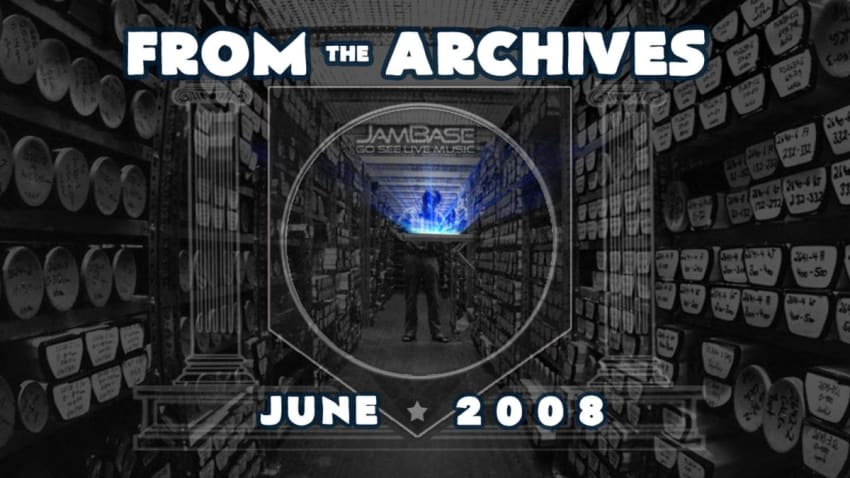Rockin’ Chair: Headed For The Hills
By Team JamBase Jun 25, 2008 • 2:10 pm PDT

 |
Blues, like most forms of folk music, thrives by being passed down from one person to another like this. Learning how to play, and what to play, is an intimate transfer of not just knowledge, but of feel and of soul.
In today’s dizzying cloud of binary information, music has no geographical boundary. Anybody anywhere can listen to another musician’s music. Videos show what notes to play when. Those ones and zeros can show the what, but not the why or the how. There is no substitute for playing alongside someone and locking into the unique communication that occurs when two people are playing music together.
Here in North Mississippi, we have our own brand of blues. It’s the Hill Country blues of Joe Callicott, R.L. Burnside and Kenny Brown. While the better-known style of Delta blues was born just down the road, the Hill Country sound is less adorned but saturated with greasy groove. Its hypnotic hum wrings a single note for every last ounce of feeling. This can take hours. The one note can pulsate and grow, fed by dancers who refill that vacated space by wringing. Rinse. Repeat.
One doesn’t normally think of hills when thinking of Mississippi. Images of the low, flat expanse of the delta, cotton fields, marshland, pine plantations (or these days, casinos) come to mind. But in the northeast corner of the state, green-hued hills ramble over the landscape, draped in kudzu and made of mud. Technically, it’s the last remnants of the Appalachian range – the toenails of the foothills. The highest point in the state, Woodall Mountain in Tishomingo County, is just 800 feet.
 |
Now that these patriarchs have gone on to the great juke joint in the sky the tradition is kept alive by Kenny Brown. For the third year in a row, he’s hosted his own picnic. The North Mississippi Hill Country Picnic takes place around the 4th of July (the 4th and 5th this year) in Potts Camp, Mississippi, just down the road from the site of Junior Kimbrough’s infamous juke joint. On the weekend of this year’s picnic, the Mississippi Blues Commission will place an historical marker at that site in honor of R.L. Burnside and Junior Kimbrough. The non-profit organization that hosts the picnic has been instrumental in this effort, along with the Holly Springs Tourism and Recreation Bureau.
 |
One of the many acts that will appear at The Picnic this year is a collective known as Afrissippi. Mississippi is known as the home of the blues, but can’t truly lay claim to it. It was handed down from person to person, tweaked and turned along the way from African roots. Many artists over many albums and many years have explored those roots. Ali Farke Toure and Ry Cooder’s Talking Timbuktu, Corey Harris’ Mississippi to Mali among them. The connection with the Hill Country was made with Otha Turner’s From Senegal To Senatobia. There are many more.
But, the lineage has perhaps never been explored so directly as with Afrissippi. The genesis of the group dates back to when Senegalese musician Guelel Kumba traveled to Oxford, Mississippi in 2002. He was struck by the similarities of the songs of Junior Kimbrough and the traditional tunes of his native land. Some of the melodies were almost identical. “One day I was playing an old African tune called ‘Nduumandi,’ and my friend Eric Deaton told me it sounded like Junior Kimbrough,” says Kumba. “He made me listen to the record and I realized they were the same.”
 |
The band’s follow-up, the aptly named Alliance, further explores the connection. The songs of Alliance, all written by Kumba, are rapt with passion and intensity. The selections range from heavy hill country drone to percussion-laden tunes that feature call-and-response vocals, and even an a capella track. Kumba sings in his native tongue, Pulaar, but the language here is the music, passed on for decades and centuries and across continents and rekindled here. Ancient blues, revitalized and kept alive from one person to the next.
Like every year so far, The Picnic’s lineup also consists of many people named Kimbrough and Burnside. After all, it’s a family affair. Participants include Duwayne, Cedric and Garry Burnside in various incarnations. Junior’s son David Kimbrough is on the bill, along with the Otha Turner’s progeny in the Rising Star Drum & Fife Band. T-Model Ford, Robert Belfour, Jimbo Mathus and Alvin Youngblood Hart are back. Local rock bands Blue Mountain and Rocket 88 are also part of the fun. And of course, Kenny Brown will close out the festivities with his now-traditional closing set and all-star jam.
It’s good fun and a good party, but this year’s picnic provides a unique opportunity that, like the picnic itself, formalizes a long held tradition. On July 3rd, there will be a workshop where budding musicians can learn from and play with the current keepers of the flame. Kenny Brown, Cedric, Duwayne and Garry Burnside and Dave and Kinney Kimbrough will all serve as workshop instructors. From person to person, the music remains vital and alive.
So, in all probability, out there in the July heat of a Mississippi cow pasture, with the sun beating down and sweat beading on foreheads, Kenny Brown or Garry Burnside or David Kimbrough will turn to a ten-year old struggling to hold his guitar up, and say, “Hit it like this, boy!”
R. L. Burnside – “Rollin and Tumblin”:
JamBase | Oxford
Go See Live Music!
